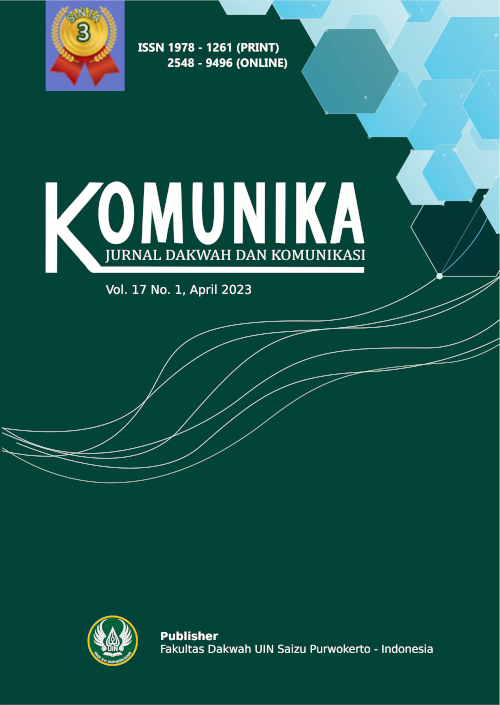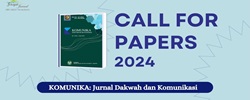When Civil Servants are Exposed to Radical Understandings: Analysis of State Apparatus Receptions about Reporting on Deradicalization Terrorism Programs on Metro TV
DOI:
https://doi.org/10.24090/komunika.v17i1.7318Keywords:
Deradicalization, reception analysis, television, civil servantsAbstract
This study examines the public reception of reporting on the deradicalization of terrorism on Metro TV. The method to be used is reception analysis from the Stuart Hall model. Reception analysis is an alternative approach to studying audiences and how to interpret messages received from a media; the starting point of this research is the assumption that the meaning contained in mass media is not only found in the text. The subject of this research is civil servants in the Secretariat of the Vice President. The study results show that in the hegemonic-dominant position of acceptance, informants accept and share media values on the issue of radicalism. Informants agree with media statements that show the existence of radicalism in society and threaten the integrity of the Republic of Indonesia. The conflicting evidence is low because several events in Indonesia indicate the existence of activities that are considered radical. Weaker resistance to media messages means a relatively strong media position influencing informants' acceptance of the text. In the position of oppositional acceptance, the informants' political awareness and reactions to the construction of media information, especially the problems of radicalism and intolerance in Indonesia, are not easily influenced by the structure of media information.References
Amirsyah. (2012). Meluruskan Salah Paham Terhadap Deradikalisasi Pemikiran, Konsep, dan Strategi Pelaksanaan. Grafindo Khasanah Ilmu.
Baran, S. J. (2011). Pengantar Komunikasi massa: literasi media dan budaya. Jakarta: Salemba Humanika.
Barker, C. &, & Jane, E. A. (2016). Cultural Studies: Theory and Practice. Sage Publication.
Briandana, R., Doktoralina, C. M., Hassan, S. A., & Hasan, W. N. W. (2020). Da’wah Communication and Social Media: The Interpretation of Millennials in Southeast Asia. International Journal of Economics and Business Administration, 7(1).
DeFleur, M. L., & DeFleur, M. H. (2016). Mass communication theories: Explaining origins, processes, and effects. Routledge.
Golose, P. R. (2009). Deradikalisasi terorisme: humanis, soul approach dan menyentuh akar rumput / Petrus Reinhard Golose. Yayasan Pengembangan Kajian Ilmu Kepolisian.
Groeninck, M. (2021). Difference and negotiation from the borders: Islamic religious actors providing theological counternarratives for deradicalisation in Belgium. Religion, State and Society, 49(4–5), 331–349. https://doi.org/10.1080/09637494.2021.1996178
Hadi, I. P. (2010). Penelitian Khalayak dalam Perspektif Reception Analysis. Scriptura, 3(1). https://doi.org/10.9744/scriptura.3.1.1-7
Hardiman, F. B. (2018). Manusia Dalam Prahara Revolusi Digital. Diskursus - Jurnal Filsafat dan Teologi STF Driyarkara, 17(2), 177–192. https://doi.org/10.36383/diskursus.v17i2.252
Hartley, J. (2012). Communication, Cultural and Media Studies: The Key Concepts. Routledge.
Jensen, K. B. (2002). A handbook of media and communication research : qualitative and quantitative methodologies. Routledge.
Khumaini, A. (2017, June 1). 7 Percobaan pembunuhan terhadap Bung Karno. Https://Www.Merdeka.Com/Peristiwa/7-Percobaan-Pembunuhan-Terhadap-Bung-Karno.Html.
Lievrouw, L., & Livingstone, S. (2010). Handbook of New Media: Social Shaping and Social Consequences of ICTs, Updated Student Edition. SAGE Publications Ltd. https://doi.org/10.4135/9781446211304
Lincoln, Y. S., & Guba, E. G. (1990). Judging the quality of case study reports. International Journal of Qualitative Studies in Education, 3(1), 53–59. https://doi.org/10.1080/0951839900030105
Littlejohn, S. W., Foss, K. A., & Oetzel, J. G. (2016). Theories of Human Communication: Eleventh Edition. Waveland Press.
Morley, D. (2003). Television, Audiences and Cultural Studies. Routledge. https://doi.org/10.4324/9780203398357
Muhammad, A., & Hiariej, E. (2021). Deradicalization program in Indonesia radicalizing the radicals. Cogent Social Sciences, 7(1). https://doi.org/10.1080/23311886.2021.1905219
Ott, B. L., & Mack, R. L. (2014). Critical Media Studies: An Introduction. Wiley-Blackwell.
Pillai, P. (1992). Rereading Stuart Hall’s Encoding/Decoding Model. Communication Theory, 2(3), 221–233. https://doi.org/10.1111/j.1468-2885.1992.tb00040.x
Pythag Kurniati. (2020, December 17). Puluhan ASN Terpapar Radikalisme Tiap Bulan, Menpan RB Ancam Pemecatan . Kompas.Com.
Ruben, B. D., & Stewart, L. (2016). Communication and human behavior . Kendall Hunt,.
Sanusi, I., & Muhaemin, E. (2019). Intoleransi Keagamaan Dalam Framing Surat Kabar Kompas. Communicatus: Jurnal Ilmu Komunikasi, 3(1), 17–34. https://doi.org/10.15575/cjik.v3i1.5034
Sedgwick, M. (2007). Islam Terrorism and The Pizza Effect. Terrorism Research Iniatiative,. Terrorism Research Journal, 1(6).
Sila, M. A., & Fealy, G. (2022). Counterterrorism, Civil Society Organisations and Peacebuilding: The Role of Non-State Actors in Deradicalisation in Bima, Indonesia. The Asia Pacific Journal of Anthropology, 23(1), 97–117. https://doi.org/10.1080/14442213.2022.2041076
Soalohon, R., & Santoso, H. P. (2017). Resepsi Khalayak Terhadap Pemberitaan Kasus Antasari Azhar Dalam Portal Berita Online. Ejournal3.Undip, 6(1).
Yunanto, S., Damayanti, A., & Novitasari, I. (2017). Ancaman dan strategi penanggulangan terorisme di dunia dan Indonesia. IPSS. http://repository.uki.ac.id/872/3/Ancaman%20%26%20Strategi%20Penanggulangan%20Terorisme.pdf
Downloads
Published
How to Cite
Issue
Section
License
Copyright (c) 2023 Afdal Makkuraga Putra, Raden Bagus Yuniadji, Heri Budianto, Riza Darma Putra

This work is licensed under a Creative Commons Attribution-ShareAlike 4.0 International License.
Authors who publish with this journal agree to the following terms:
- Authors retain copyright and grant the journal right of first publication with the work simultaneously licensed under a Creative Commons Attribution-ShareAlike 4.0 International License that allows others to share the work with an acknowledgement of the work's authorship and initial publication in this journal.
- Authors are able to enter into separate, additional contractual arrangements for the non-exclusive distribution of the journal's published version of the work (e.g., post it to an institutional repository or publish it in a book), with an acknowledgement of its initial publication in this journal.
- Authors are permitted and encouraged to post their work online (e.g., in institutional repositories or on their website) prior to and during the submission process, as it can lead to productive exchanges, as well as earlier and greater citation of published work (See The Effect of Open Access).





















